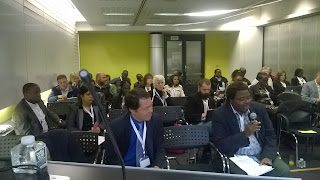 Cross posted from Afro Leo, Link (CC-BY)
Cross posted from Afro Leo, Link (CC-BY)
As reported by Jeremy Speres (here) South Africa’s Copyright Amendment Bill, 2015 has been published for public comment. The Department of Trade and Industry (DTI) has lined up several stakeholder consultations, one of which was held on 13 August 2015. The consultation process is intended to culminate in a Copyright Amendment Bill Conference on 27 August 2015.
Stakeholders are also running with several initiatives to feed into the consultations. For instance, six university and civil society groups* hosted a meeting on Tuesday 11 August with DTI and Department of Arts and Culture (DAC) officials and other stakeholders in Pretoria on the Bill. The well- attended meeting discussed the majority of the proposed reforms [see the agenda here]. Background information on the meeting is available here. For some reports on the meeting see here and here. One of the outcomes of the meeting will be a series of written comments which will be submitted by stakeholders to the DTI on the Bill. These will be archived on Afro-IP as they become publicly available.
 |
| Workshop on Internet Rights, Cultural Development and Balancing Features in South African Copyright Reform. Photo credit: Theresa Hume |
One aspect that immediately caught my attention on a first reading of the Bill is the need to carefully integrate the Bill’s proposals with the amendments introduced by the IP Laws Amendment Act (IPLAA) of 2013. These proposals are not yet in force but are expected to do so in the short to medium term. For the most part, the drafters of the Bill have kept the IPLAA in mind but some slippage is evident here and there. For instance, both the Bill and the IPLAA introduce a section 39A which covers different substantive areas. Another example is the Bill’s introduction of a new definition of reproduction which completely overlooks the IPLAA’s amendment. This evolution of the definition has proceeded as follows:
1) Copyright Act, 1978 (current provision): “reproduction”, in relation to-
(a) a literary or musical work or a broadcast, includes a reproduction in the form of a record or a cinematograph film;
(b) an artistic work, includes a version produced by converting the work into a three-dimensional form or, if it is in three dimensions, by converting it into a two-dimensional form;
(c) any work, includes a reproduction made from a reproduction of that work, means a copy made of a fixation or audio-visual fixation of a performance; and references to “reproduce” and “reproducing” shall be construed accordingly;
(a) a literary or musical work or a broadcast or a traditional work, includes a reproduction in the form of a record or a cinematograph film;
(b) an artistic work or a traditional work, includes a version produced by converting the work into a three-dimensional form or, if it is three-dimensions, by converting it into a two-dimensional form; and
(c) any work, includes a reproduction made from a reproduction of that work, means a copy made of a fixation or audio-visual fixation of a performance; and references to “reproduce” and “reproducing” shall be construed accordingly;
3) Bill, 2015: “reproduction” means a copy made of a fixation or audio-visual fixation of a performance.
If the Bill is enacted in its current form and comes into force after the IPLAA, it will raise the question of whether it repeals the IPLAA amendments by implication (on which see Shozi v Minister of Justice, Kwazulu 1992 SA 338 (N)). If that is the case, then a crucial portion of the IPLAA’s intended framework will be unraveled. As the IPLAA itself came under a lot of criticism, such unraveling may be welcome in some quarters. It is clear that the Bill is a work in progress, and it is hoped that as it is refined, issues like these, and those identified by other commentators/stakeholders, will be resolved. Judging by the robust and constructive engagement at the meeting, the public consultation process will provide the DTI with ample recommendations to enhance the Bill.
————————
* University of Cape Town Intellectual Property Unit, the University of South Africa Intellectual Property Flagship, the University of the Witwatersand Library, the American University Washington College of Law Program on Information Justice and Intellectual Property, Creative Commons South Africa, and the Cultural Industries Legal and Advisory Centre.




